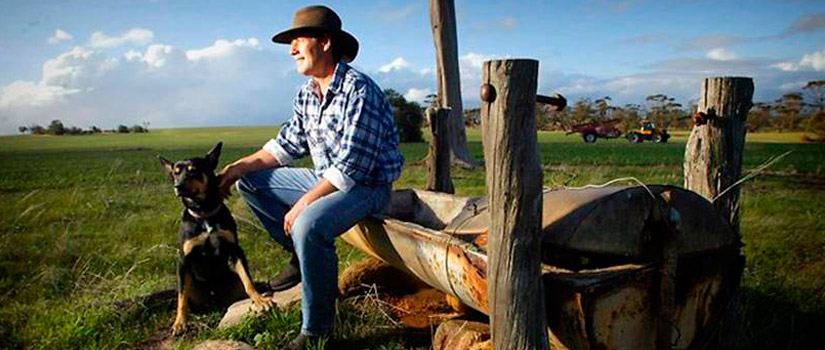HOW SMALL TASKS BECOME BIG DOINGS
Curtis Seltzer
You do a lot of tending on a farm.
“Tend” in both English and other European languages is rooted in words that mean “to set on fire” or “to kindle.”
I thought about this at 3:30 a.m. one 25-below morning earlier this year, when Nellie, our Yellow Lab, started barking downstairs.
“Hear that?” the resident alert system asked. Her hearing is more acute than that of the tawny owl, which can pinpoint in total darkness by sound alone the precise direction of a scurrying mouse in less than a second.
“I don’t hear anything,” I said.
“Nellie’s barking,” she said.
“That’s not barking. That’s our wind chimes shivering in the cold.”
More noise from downstairs.
“That’s barking!”
“That’s not barking,” I mumbled. “That’s venting.”
I assumed that this would end the discussion since I am narrowly considered to be the resident expert on female venting.
“Nellie has to go to the bathroom,” she said.
“Bathrooms are indoors,” I said, just to keep the architectural record straight.
“Do you want to clean it up in the morning?”
I am the designated solution for certain local situations. This consensus has been arrived at by the unanimity of one.
So I went downstairs. Nellie greeted me by rolling on her back and presenting her belly for a good rub.
I opened the kitchen door. With the wind chill, it was almost 50 below. I shooed her outside. ‘Why are you sentencing me to sub-Siberian temperatures?’ her eyes asked.
Nellie sat on the porch next to the door, staring into the blizzard. She was motionless for one minute, two minutes, five minutes, then nearly ten. I let her back in. She ran to her cup, drew into a curl and was fast asleep in seven seconds.
I threw a couple of sticks into the woodstove so that I had something positive to report to the authorities.
I crawled back into bed.
“Is Nellie all right?”
“Of course,” I said.
“Did she go?”
“No,” I said.
“So why was she barking?”
“Well, if we eliminate venting as the most likely explanation, I have two other ideas. Here’s the first: She was testing her emergency-response system. Which I passed.”
“What’s the other?” she asked.
“She wanted her belly scratched.”
“Did you scold her?” she asked.
“Not orally.”
“Did you frown at her?”
“Not when she was looking.”
“Did you at least stoke the fire while you were down there?”
“Yes.”
“There you go,” she said. “Nellie knew the fire needed fuel to keep us warm. She’s such a smart dog. I don’t know why you punished her by putting her out in this weather.”
“I guess it’s because I’m mean.”
“Well, let’s just keep that between us,” she said.
I’ve been tending woodstove fires for almost 35 years. I’m not bragging. I mean this isn’t an item you put in your obituary, at least not in the first or second paragraph unless you need it padded out with something unique or upbeat.
He may have been mean to his dog, but he kept the fire going more or less continuously every winter without having to be nagged about it too much.
Tending, after all, is not just giving the fire an occasional poke in the gut.
I’ve acquired essential tending tools over the years: a pair of long leather hearth gloves, a blow poker that directs a stream of hot air onto smoldering coals (inhaling is not advised), and a heavy metal poker with a right-angled, pointy barb near the end.
Some pokers, also called fire irons, incorporate an upside-down, backward, C-shaped barb, which, though classical in design, is, in my experience, not handy for repositioning firewood lengths in a stove. A poker with a bad barb might as well take up pacifism.
Farmers also tend livestock.
This involves planning, prevention, and observation related to animal health and safety, medication, adapting their care to changes in conditions, and above all, chasing and cursing. I have seen cattle die from gorging on fresh clover in the spring and from stuffing themselves on fallen apples in October. Both of which I consider my fault for not tending.
A failure to tend conscientiously every day can keep you cold on the one hand and poorer than need be on the other.
Growing up in a city, I never had to tend anything except present company. I attended class in college, but tended toward distractions.
Tending is an old necessity that modern urban life has made largely unnecessary. Urban tending may be reduced to watering a window cactus or walking the dog. So who mourns this loss?
But if we lose the habit of tending in our lives, we may fall short tending to each other.
Select individuals and institutions–from day care and schools to senior facilities and hospices–now do much of our traditional family tending. On the whole, they do a respectable job–certainly better than I would do.
Nowadays, people seem to think time itself is now too dear to spend much of it tending our families and friends. This isn’t a criticism as much as it is just taking notice of where we are. I was admittedly glad to have substitute tenders take my place. I know that I should try harder about staying in touch and showing care, but I’m more modern than not.
What, then, is the cost of stripping tending out of our lives? Do we lose the rewards of meeting small responsibilities and the connections to the quiet between the beats? Do we disengage from life or lose something essential in ourselves?
I really don’t know. It’s perhaps something to think about the next time I can’t figure out how to stuff a 30-inch-long log into a 26-inch-long firebox.
I discussed these points with Nellie as soon as I put them to paper.
Her response was unsurprising. She rolled over onto her back, presenting her belly for a scratch and a rub. It is Nellie’s common reply, simultaneously a surrender and a request.
She didn’t say much, but she gave me the opportunity to tend to her needs–which I did.
Curtis Seltzer is a writer and land consultant who lives on a cattle-and-timber farm in Blue Grass, Va. He is the author of How To Be A Dirt-Smart Buyer of Country Property and four collections of his columns at www.curtis-seltzer.com. He can be reached at curtisseltzer@htcnet.org.


